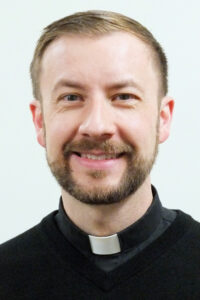By Father Thom Hennen
Question Box
Many of us have older children who are no longer practicing the faith. How can we invite them back? How do we address the issue of receiving Communion if they have

been away from the Church for a long time and may need to receive the sacrament of reconciliation?
It is hard to see people we love and for whom we want the highest and best things walk away from something we hold so dear. Many parents of adult children who have stopped going to church heap guilt on themselves as though it is exclusively their fault their children did not keep the faith. Alternatively, they might heap guilt on their children, hoping to prod them back. Chances are if the “Catholic guilt” strategy didn’t work when they were teenagers, it won’t work now.
While guilt is not always a bad thing, it is also not the best motivation. We want people to practice their faith not because their mother threatens to haunt them from beyond the grave if they don’t or because they fear the pains of hell. Ultimately, we want people to embrace and live the faith because they believe it is good, true and beautiful. We hope that they recognize, like all of us, they are “works in progress” who need God’s grace in prayer and the sacraments to be more fully the people God made them to be. To this end, I think some gentle pressure can be applied appropriately from time to time, but it should be more invitation and less inquisition.
Regarding the confession question, personally I would avoid the approach of pointing out that they are not in a “state of grace” and therefore should not receive Communion. While this is language we sometimes use and while one should be properly disposed to receive Communion (i.e. not aware of any unconfessed serious sins), it tends to come off as judgmental, as though we know objectively the state of their soul.
Perhaps in addition to inviting them to come to Mass, you could also gently invite them to accompany you to the sacrament of reconciliation whenever it is offered in your parish. This shows that it is not just them who needs this sacrament. They likely already have a sense that they need and even desire this at some level but they are more likely to respond to an invitation than a threat. Hopefully, a good priest can lovingly guide them through the sacrament.
As well as we think we know our family members, we need to remember that we don’t know all of their interior struggles or what made them either slip away from or shake their fist at God, the Church or religion in general. We need to pray for their peace and healing.
I often tell concerned parents, grandparents or siblings that in addition to praying for their loved ones to return to the faith, they should also pray for the person who may be that credible witness to draw them back. We tend to dismiss those closest to us and so a more effective witness may be a co-worker, friend or neighbor. As hard and effectively as St. Monica prayed for her wayward son, St. Augustine, he still had to encounter St. Ambrose to seal the deal.
Lastly, it is important that we first witness well to the faith, even if we are less than perfect. The more people see that some of the kindest, most well-adjusted, intelligent, giving and happy people they know also happen to be Catholic, the more likely they are to put two and two together.
(Father Thom Hennen serves as the pastor of Sacred Heart Cathedral in Davenport. Send questions to messenger@davenportdiocese.org)






